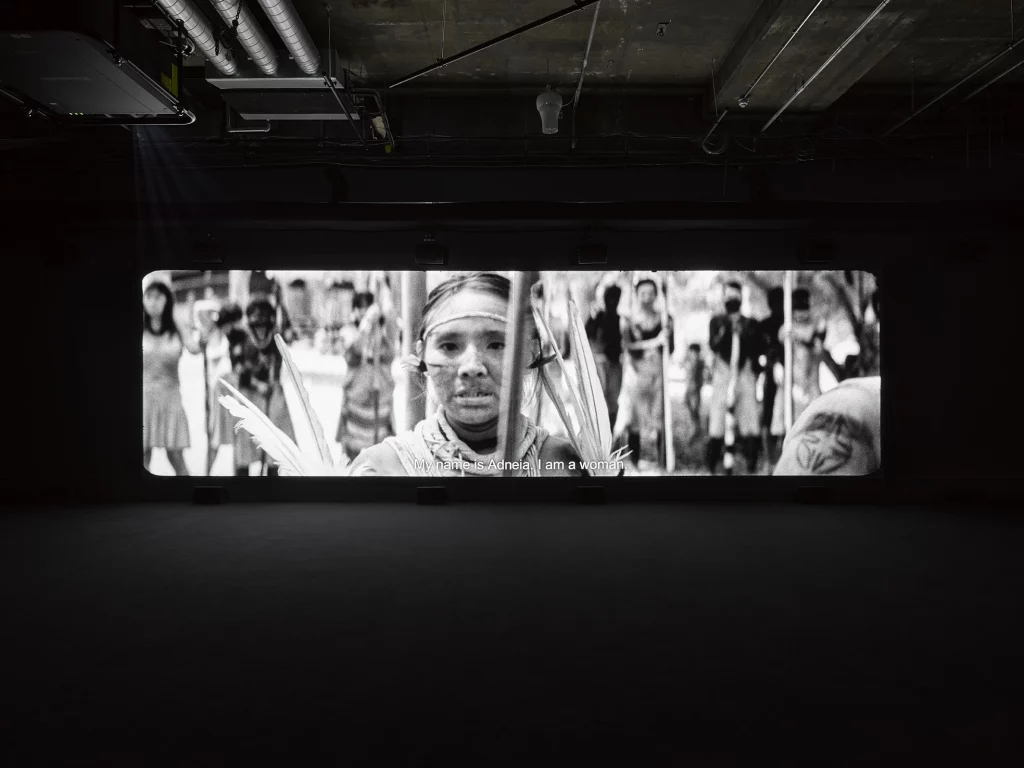Award-winning artist Richard Mosse presents a major new installation, featuring an original score from Ben Frost and cinematography from Trevor Tweeten at London’s 180 Studios.
Broken Spectre is the culmination of three years of painstaking documentation from artist Richard Mosse, who uses a wide range of scientific imaging technologies to capture environmental crimes in the world’s most crucial yet ignored ecological war zone. Filmed in remote parts of the Brazilian Amazon, Mosse has worked in collaboration with artist and cinematographer Trevor Tweeten and composer Ben Frost to overcome the inherent challenges of representing the urgent and ongoing effects of climate change, making visible the immediate impact of climate catastrophe. Alongside Broken Spectre, the artists’ most ambitious project to date, 180 Studios will present a selection of the artist’s photographs from the project, including large-scale photographs that have not been exhibited in the UK before.


“The scale of this catastrophe frequently unfolds in ways that are too vast to comprehend, too minute to perceive, and too normalised to see,” says Richard Mosse. “I utilise scalar shifts to move between different temporalities of seeing — from the piercing vision of satellite cameras to the vibrant matter of interdependent rainforest biome seen by an insect or microorganism, to the sweeping vista of the pioneer settler, an uncanny cowboy realism evoking the spirit of Manifest Destiny that underwrites the rainforest’s destruction. Broken Spectre presents a phasing of ecological narratives that shifts wavelengths across environmental, anthropocentric, and nonhuman violence.”
“Broken Spectre presents a phasing of ecological narratives that shifts wavelengths across environmental, anthropocentric, and nonhuman violence, to articulate different fronts of destruction at play in the Amazon. Time itself is a crucial part of this catastrophe, as mass deforestation began in earnest in the early 1970s when the military regime built the Trans-Amazonian Highway (Rodovia Transamazônica), opening the primeval forest for development. Only a few generations later, this development has destroyed one fifth of the Amazon rainforest to make way for the cattle, soybean, and mining industries.”


“Data gathered by satellites over the last three decades has revealed that within a few years we will reach the very tipping point at which we can no longer save the Amazon, at which it will no longer be able to generate its own rain, triggering mass forest “dieback” with carbon release at devastating levels, impacting climate change, biodiversity, and local communities. This is a world emergency that is entirely man made. The burning and other forms of deforestation that we witnessed are carried out wilfully by millions of people and actively encouraged and bolstered by President Jair Bolsonaro, who has defunded and undermined Brazil’s environmental protection agencies. Making and releasing this film in the days leading to the Brazilian election is a deliberate attempt to raise awareness of these issues internationally.”
“In a key scene in the film, a young Indigenous woman from the Yanomami community confronts the camera and exclaims, “You white people, see our reality. Open your minds. Don’t let us talk so gallantly and do nothing. White people! Tell your fathers and mothers. Explain to them.” My film examines an intergenerational destruction; a legacy passed on from grandparents to grandchildren. We have only one generation left to save the Amazon rainforest.”
Mosse has documented some of the most significant humanitarian and environmental crises of our time. He has mapped the journeys of refugees and their camps across Europe, the Middle East, and North Africa, and documented an ongoing cycle of conflict in eastern Democratic Republic of Congo. Combining reportage and contemporary art photography, he creates images of striking and unsettling beauty that push the boundaries of his craft to try and convey the scale and tragedy of events that are complex and opaque, often working critically with military-grade imaging technology and using camera, film, and sound in unconventional ways.


In 2017 Mosse was awarded the Prix Pictet for series Heat Maps, panoramas of refugee camps made using a military-grade thermographic camera, designed to detect body heat and classified as a weapon under international law. In 2013 he represented Ireland at the Venice Biennale with The Enclave, an immersive six-channel video installation capturing war zones in Eastern Congo that utilised 16mm infrared film, shooting a discontinued military surveillance film developed to detect camouflage, producing a landscape that glowed a disquieting pink.
Broken Spectre is presented by 180 Studios and co-commissioned by the National Gallery of Victoria, Melbourne, the Westridge Foundation and VIA Art Fund, and by the Serpentine Galleries. Additional support provided by Collection SVPL and Jack Shainman Gallery
An artist’s book of Broken Spectre, published by Loose Joints, will accompany the exhibition, with essays by Txai Suruí, Christian Viveros-Fauné, Gabriel Bogossian, and Jon Lee Anderson.
Richard Mosse: Broken Spectre
180 The Strand, London, WC2R 1EA
12 October 2022 – 9 April 2023
11am – 7pm, Wednesday– Sunday
Tickets are available now. For more information about Richard Mosse, visit his website.
Watch next: Jon Rafman’s Minor Daemon now showing at 180 Studios



















